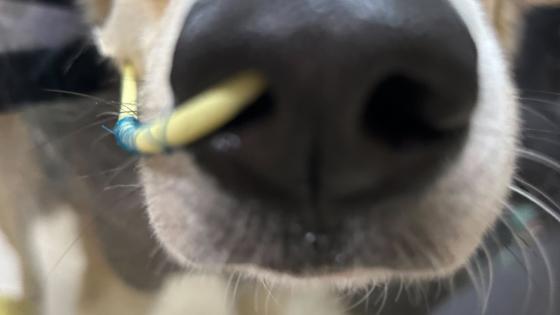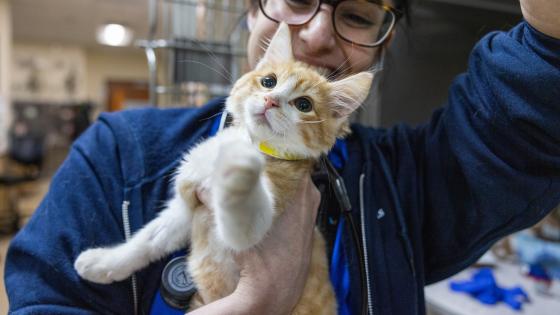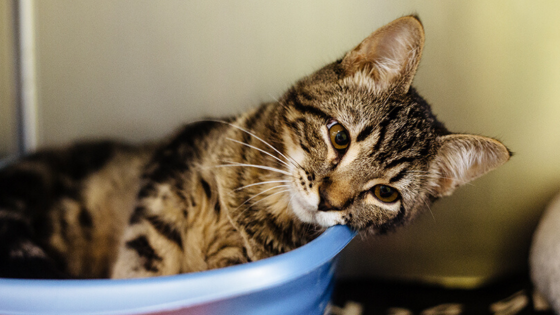
HEATWAVE PUTS PETS’ LIVES IN DANGER
A spike in temperature means a spike in emergencies for pets suffering from heat stroke, burns, and other life-threatening, heat-related illnesses and injuries. Understanding a pet’s limitations and taking extra precautions in warm weather may be the difference between life and death.
PORTLAND, Ore. – As a heatwave approaches, the experts at DoveLewis Veterinary Emergency & Specialty Hospital urge families to be extra aware of their pet’s behavior, environment, and limitations. This week, the team of emergency veterinarians has already treated patients suffering from heat-related illnesses, and they are worried for what is to come as the temperature continues to rise.
“Don’t underestimate the danger. A hot day may be uncomfortable for us, but it can be fatal to animals,” says Dr. Shana O’Marra, DoveLewis Chief Medical Officer. “You’re their best chance to keep your pet safe and extra precautions will make a difference. For instance, if the pavement is too hot for your bare hands, it’s too hot for your pet’s paws.”
Other tips from the emergency hospital include:
- Never leave a pet in a car. Even on a mild to hot day, temperatures in a closed car can exceed 120 degrees in minutes, creating a dangerous condition for any animal. Cracking a window or parking in the shade does not help.
- Give pets extra water. Hydration is crucial to avoid illness. Whether a pet is indoors or outdoors, fill their water bowls several times a day.
- Do not overdo outdoor exercise. Dogs do not know when they need a break. Stop frequently for shaded breaks and offer plenty of water.
- Take extra precaution with older dogs and dogs with shorter noses. They are susceptible to higher temperatures and at a greater risk of heatstroke.
- When in doubt, stay indoors. Avoid spending long periods of time outside during the hottest time of the day.
One warm-weather danger that is often overlooked is “high-rise syndrome” which commonly refers to cats and dogs falling from a multi-story surface. Injuries can include shattered jaws, punctured lungs, bruising to the heart and lungs, fractures or broken bones, brain swelling and internal bleeding.
Tips to prevent high-rise syndrome in dogs and cats include:
- Watch pets at all times when they are on balconies, on patios or near open windows.
- Don't leave windows open – even a crack – as pets can nose them open wider.
- Don't depend on window screens to keep pets from falling and close windows before throwing toys for your pets to chase.
- Keep furniture that pets can climb on away from windows and railings.
- Install air conditioning so windows can be closed on upper floors.
Know the signs of heatstroke in dogs and cats:
Heatstroke can be fatal if not treated quickly. Signs of heatstroke include:
- Panting
- Vomiting
- Warm and dry skin
- Rapid heartbeat
- Staring or anxious expressions
- Collapsing
- Refusal to obey commands
Tips for keeping urban farm animals safe in extreme heat:
Rabbits
- Keep rabbits inside on hot days. But if that is not possible, make sure their outdoor hutch is well-ventilated.
- Keep a close eye on rabbits, especially older ones. They are very susceptible to heat stroke.
- Make sure they have plenty of access to clean, cool water.
- Make sure they have access to shade. String up fabric, a blanket or a tarp to provide them with shade.
- Dampen rabbits’ ears and body with cool water. Do not submerge a rabbit in water.
- Avoid handling rabbits in extreme heat. This could lead to added stress.
- Refrigerate a ceramic tile or piece of marble for rabbits to lie on.
Signs of heat stroke in a rabbit:
- Reddening of the ears
- Panting
- Lethargy
- Salivating
- Weakness/slow movement/reluctance to move
- Seizures or convulsing
- Poor response to stimulus
Chickens
- Make sure chickens have plenty of access to clean, cool water.
- Feed them juicy fruits and vegetables, like watermelon and cucumber.
- Make sure they have access to shade. String up fabric, a blanket or a tarp to provide them with shade.
- Provide an area with dry, loose dirt for dust baths. They’ll wallow down until they reach cool soil.
- Make sure your coop is well-ventilated.
- Mist your chickens with cool water, or provide a gentle sprinkler system or misting system in their yard or pen area. Do not dump water on them or submerge them in water.
Signs of heat stroke in a chicken:
- Continuous panting with wide open mouths
- Pale comb or waddle
- Spreading wings away from the body
- Refusing to eat or drink
- Diarrhea
- Lethargy
- Seizures or convulsions
Goats and sheep
Goats and sheep are more tolerant to heat than other livestock, but they still require special attention on hot days.
- Make sure they have plenty of access to clean, cool water as they will drink more on a hot day.
- Make sure they have access to shade. String up fabric, a blanket or a tarp to provide them with shade.
- If your goat is comfortable with water, mist or spray their legs with cool water.
Signs of heat stroke in a goat or sheep:
- Continuous panting
- Rapid breathing
- Weakness and inability to stand
Owners who suspect their pet is experiencing heatstroke, or whose pet has fallen from a window, should call their regular veterinarian or DoveLewis immediately. In the meantime, they can help lower their pet’s body temperature by applying towels soaked in cool water to the hairless areas of the pet’s body (the tips and back of the ears, foot pads, belly and inner thighs). Use a fan to help cool the animal while they are wet. Even if the pets seems to cool down, it is still imperative to visit a veterinarian immediately as temperatures often spike again or cool below a safe, normal temperature. Please note: Avoid completely immersing a pet in water, since heat cannot leave the body as effectively in this situation, and extreme changes in body temperature are dangerous to the pet’s health.
Recent Posts
Spring Pet Safety Tips
With spring in the air, pet owners should be aware of potential seasonal hazards. While you enjoy the longer, warmer days, keep these tips in mind!




